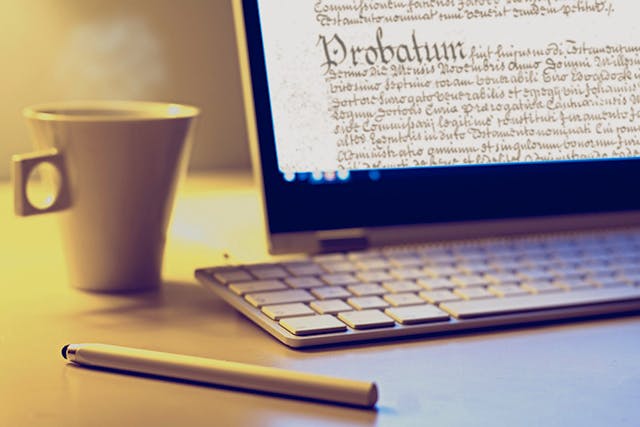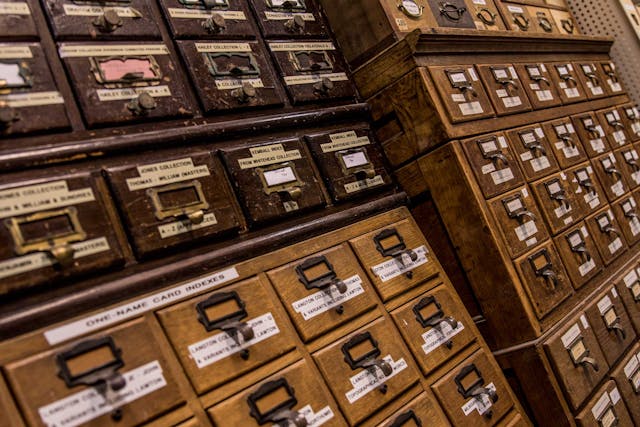
Christine Worthington | Jul 2, 2021, 9:17 AM
Our Volunteers: The Great Card Index
'Of the making of indexes, as of books, there is no end. Nor should there be, for every body of accumulated fact is of value — greater or less — to the modern world, in the same degree that its details are readily and dependably accessible.'
When American historian and academic Willard Rouse Jillson wrote these words in 1953, in an article for the American Archivist entitled ‘The Indexing of Historical Materials’, he had never seen a personal computer, and had no concept of the amazing possibilities of digital searching - but his words are as true now as they ever were.
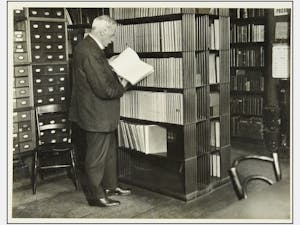
Percy Boyd peruses a book and part of the Great Card Index can be seen in the background.
We have a strong indexing program at the Society of Genealogists, and a network of volunteers undertaking projects from their homes throughout the UK and beyond (including in the United States, Australia, New Zealand, France and Canada).
In recent times our home indexing program has become more important, as our many onsite volunteers have transitioned to taking on home projects during periods of lockdown.
Over time members will have perhaps heard us talking about the Great Card Index, the Pedigree Rolls project and the various SoG Data Online projects. This a perfect time to reflect on what these projects are, what value they hold, and what the Society hopes to achieve by them.
The Great Card Index
The Great Card Index is as old as the Society itself. Part of it can be seen to the left of Percy Boyd in the photo above.
Sue Gibbons provides some good background to the history of the index in the Society's centenary history. In September 1910 in an article proposing a Society of Genealogists, George Sherwood suggested the creation of a reference library in central London that would accommodate 'a great consolidated index in one alphabet, on slips, on the card index system'. In 1911, in the very year of its establishment, the Society collected over 12,000 cards. By 1912 there were 500,000. In 1924 there were 2.5 million. In 1931 nearly 3 million! In 1932 many cards were removed and their information typed up and bound into surname-specific books, still held in the library today.
The GCI is the culmination of a concentrated effort by hundreds of people over at least three decades and compiled using sources such as marriage licences, wills and admons, Chancery cases, subscription lists, deeds, historical monographs and parish registers. Many cards also refer to unique resources in the society's archival collections. These people would be proud to see their efforts were not wasted.
The GCI was digitised two decades ago to replace the physical index, which would have freed up considerable space in the building.
Given that the cards themselves are in alphabetical order by the main entry surname, why bother to index them at all? The reason is that even within a simple alphabet range of cards e.g. A-Ac there are many, many other surnames that appear on the cards from all through the alphabet. The indexing process will give our members so many more access points than just the main entry surnames - a benefit the users of the original cards didn't have available to them.
Since the content of the cards themselves is so varied, it was thought that the simplest approach to creating a modern index would be to draw out basic links between people, places and years - the types of fields that may inspire today's researchers to want to seek images of the original cards to glean further information.
These fields are indexed into spreadsheets that can be uploaded to SoG Data Online (the digital resources database on the society's website).
The image reference numbers can be used to carry out a further search to reveal the names of the other people listed on a card. While the card images themselves are not currently online, the image reference numbers can be used to assist the Society's library and genealogy staff to identify particular card images researchers may be interested in.
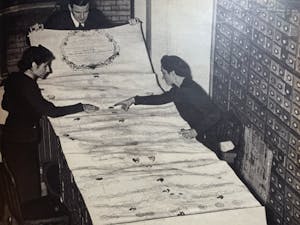
As staff lay out an enormous pedigree in 1939, a part of the Great Card Index can be seen on the right..
There are a number of challenges that our GCI indexers face. The cards are mostly handwritten with varying degrees of legibility. The fact that information was contained on small index cards means there are abbreviations (some standard and some not-so-standard) and Latin terms in use to conserve space. Since the time of the creation of the GCI, and even since the Society ceased adding to it in the late 1930s, names of places have evolved, civil parishes have changed, county border lines have changed here and there.
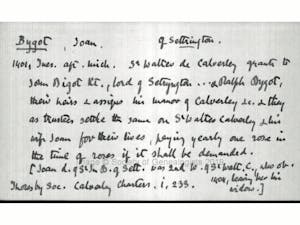
We're not sure what rent is like in Settrington these days but Sir Walter Caverley and his wife Joan were, in 1401, 'paying yearly one rose in the time of roses if it shall be demanded'.
Fortunately, most cards contain information that is straightforward and easily read, interpreted and indexed. A relatively small number of cards have newspaper clippings from the colonies pasted to them.
Some cards are not so straightforward and our indexers engage in the intellectual exercise of being as true as they can be to the original contents of the card, while putting themselves in the shoes of modern researchers and, where appropriate, making indexing decisions that will assist modern-day researchers to find their families. I would venture to say that GCI will keep your brain sharp as any crossword or Sudoku!
Sometimes interesting details can be found.
To assist these indexers we have been fortunate to have the guidance of several proofreaders, 'the brains trust', who were involved in the pilot for the project and intimately understand the particular challenges involved. Their assistance has been invaluable for taking the project forward.

In 1918 an inquest was held for Edwin Boyle, who was killed while experimenting with an invention to enable pilots to descend in parachutes in case of emergency.
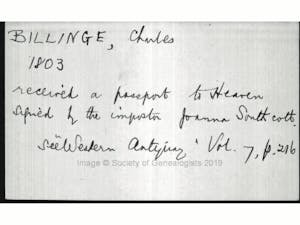
In 1803 Charles Billinge received a passport to Heaven signed by the impostor Joanna Southcott.
Volunteer proofreader Graham Simons has also been a tremendous support for this project with the provision of training resources and presentations. Great Card Indexers have also made great use of our Volunteer Community Forum, where they talk about the challenging aspects of their work and help each other out. Over 50 people work on this project, mostly from within the UK, but also from Australia, Canada and the United States.
We're grateful for the efforts of our Great Card Indexers; their work enables this colossal resource, so central to the early work of the society, to live on and be a part of the society's future.
Please contact us for more information
Our Courses and Talks

New Courses, Talks & Walks
Discover new courses, talks, walks and visits each month. Delivered by experts in genealogy or history our educational opportunities cover a vast array of topics. From techy tools to history to genealogical research tips. Check out this month's offering (and beyond) here.
Calendar View
Know you have a quieter month ahead and want to plan in some learning time? Scroll through our calendar to discover our vast array of courses, talks, walks and visits. From 12 week evening courses, to lunchtime chats. There's something for everyone.
Free Events for Members
We regularly hold events focusing on our collections, alongside members' social sessions, and updates. Discover upcoming 'free for members' events, and find your genealogy community!
Join us
As a member, you can make the most of our resources, access our experts, and find a welcoming community of people interested in family history and genealogy.
We all have roots. Let’s find them together.
